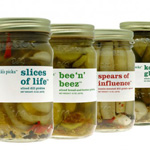 Boulder Popcorn, Cambria's Cream Heirloom Popcorn (Louisville, CO) – Boulder Popcorn is reminding people how sweet and buttery natural corn tastes (before microwaves entered the picture). It is a hulless corn, so no flossing necessary post munchies.
Boulder Popcorn, Cambria's Cream Heirloom Popcorn (Louisville, CO) – Boulder Popcorn is reminding people how sweet and buttery natural corn tastes (before microwaves entered the picture). It is a hulless corn, so no flossing necessary post munchies.
Some best-sellers from Foodoro include:
 Dee's Mini Organic Doughnuts, Crazy Eight Sampler (Kentfield, CA) – Free of chemical preservatives, hydrogenated oils, trans fats, colorings and artificial flavors, these hand-dipped doughnuts come in delicious flavors like Dagoba Chocolate Orange, Meyer Lemon, and to Chai For.
Dee's Mini Organic Doughnuts, Crazy Eight Sampler (Kentfield, CA) – Free of chemical preservatives, hydrogenated oils, trans fats, colorings and artificial flavors, these hand-dipped doughnuts come in delicious flavors like Dagoba Chocolate Orange, Meyer Lemon, and to Chai For.
 Rick's Picks, Pregnancy Pack (New York, NY) – From meager beginnings in a one-bedroom apartment in Brooklyn, to award-winning distinction at the International Pickle Festival, Rick Fields has taken the art of pickling to a whole new level. The Prego Pack is the perfect gift for a mommy-to-be. For more adventurous pickle lovers, check out the Phat Beets and the Smokra (pickled okra with smoked paprika).
Rick's Picks, Pregnancy Pack (New York, NY) – From meager beginnings in a one-bedroom apartment in Brooklyn, to award-winning distinction at the International Pickle Festival, Rick Fields has taken the art of pickling to a whole new level. The Prego Pack is the perfect gift for a mommy-to-be. For more adventurous pickle lovers, check out the Phat Beets and the Smokra (pickled okra with smoked paprika).
Is the rise of companies like Foodoro and Foodzie a sign of how the food marketplace is changing? While there is nothing like the experience of going to a real life farmer's market, smelling the fresh produce, tasting samples, and interacting with producers themselves, not everyone can afford the time, leisure, or access to do so.
Emily Olson, co-founder and CMO of Foodzie, explained, "The concept behind Foodzie came to be because I wanted to create a better place where consumers could both discover unique products and get to meet the people behind their food." Prior to founding Foodzie, Emily worked for a specialty food retailer and had the opportunity to work closely with the buyers. She said, "I saw all these samples that were sent into our office everyday that never made it onto the shelves of our stores. There were just too many barriers, even for food producers with fantastic products."
Jay Moon, co-founder of Foodoro, echoed this sentiment. He noted, "Many independent foodmakers don't have the resources to do much in the way of marketing. We want to make it really easy for producers to market and sell directly to customers, and part of that is building their e-commerce reach." Foodoro provides a customizable e-commerce widget that vendors can embed on their own sites to allow customers to easily buy their products.
Foodoro has also reached out to the food blogging community, allowing bloggers to use this widget as part of an affiliate program where they can earn a percentage on purchases made through referrals.
While the overall reaction from the food community towards these sites have been generally positive, a few critics have raised the issue that online market places like Foodoro and Foodzie go against the principles of eating locally.
Jay responded, "Actually, shipping a package produces less carbon emissions than driving even a short distance. Studies have shown that, by far, the largest environmental cost of traditional shopping is when a consumer drives a car to a store."
"For many people eating everything locally is almost impossible," Emily added. "Often there are products that just aren't available locally and we want to enable people to support small producers in the US rather than turn to their supermarket where they will all too often be buying imported goods."
Both Foodoro and Foodzie encourage people to support local producers, and get out to their local farmer's market. Foodoro has a store and farmer's market locator for many of their foodmakers, and Foodzie allows people to view their producers by location, enabling consumers to make their own choices about buying locally.
Despite the occasional neigh-sayer, I for one am grateful for this apparent rise of the foodie online market. It supports the underdog and I like that. Small bootstrap businesses devoted to specialized goods, family-run operations, artisan producers with a passion for quality and time-honored traditions, rock on.
Sites like Foodoro and Foodzie just may save the underdog of the food world in a time when they are in danger of extinction at the hands of efficiency and modernization.

 BonBonBar, Single Malt Scotch Bar (Los Angeles, CA) – Bold enough for Scotch lovers and smooth enough for all chocolate lovers, the combination of single malt scotch and dark chocolate is grown up decadence at its finest.
BonBonBar, Single Malt Scotch Bar (Los Angeles, CA) – Bold enough for Scotch lovers and smooth enough for all chocolate lovers, the combination of single malt scotch and dark chocolate is grown up decadence at its finest. 

